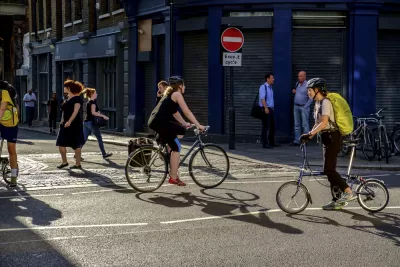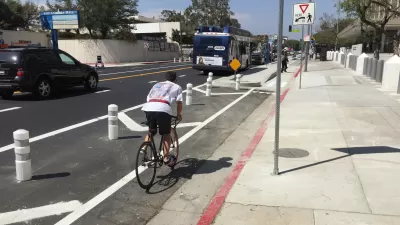Research from Europe shows bike infrastructure doesn't add to urban traffic and can shift mode share from cars to bikes and reduce the need for solo car trips.

Despite claims that cycle lanes added during the pandemic contributed to an increase in London's traffic congestion, research shows the city's traffic was largely the same in 2021 as in 2019, before the bike lanes were installed. David Metz reports that cycle lanes actually reduce the share of trips taken by car, which could diminish congestion as well. Thanks in part to aggressive measures taken by the city to discourage car trips, the use of private transport in London fell from 48 percent to 37 percent between 2000 and 2019.
"It’s important to note that creating cycle lanes reduces the space available for cars but does not necessarily get people out of cars. Copenhagen is a city famous for cycling, with 28 percent of journeys made by bike. Yet car traffic is only slightly less than in London." Meanwhile, residents of Copenhagen take only half as many public transit trips as Londoners. In fact, "there are no major European cities with high levels of both cycling and public transport. "
With revenues from public transit ridership drastically reduced by the pandemic, Metz writes, it is investments in cycling infrastructure that would "make the most sense for reducing car use in London."
FULL STORY: Why Cycle Lanes Aren’t Responsible for Urban Congestion

Planetizen Federal Action Tracker
A weekly monitor of how Trump’s orders and actions are impacting planners and planning in America.

Map: Where Senate Republicans Want to Sell Your Public Lands
For public land advocates, the Senate Republicans’ proposal to sell millions of acres of public land in the West is “the biggest fight of their careers.”

Restaurant Patios Were a Pandemic Win — Why Were They so Hard to Keep?
Social distancing requirements and changes in travel patterns prompted cities to pilot new uses for street and sidewalk space. Then it got complicated.

California Homeless Arrests, Citations Spike After Ruling
An investigation reveals that anti-homeless actions increased up to 500% after Grants Pass v. Johnson — even in cities claiming no policy change.

Albuquerque Route 66 Motels Become Affordable Housing
A $4 million city fund is incentivizing developers to breathe new life into derelict midcentury motels.

DC Area County Eliminates Bus Fares
Montgomery County joins a growing trend of making transit free.
Urban Design for Planners 1: Software Tools
This six-course series explores essential urban design concepts using open source software and equips planners with the tools they need to participate fully in the urban design process.
Planning for Universal Design
Learn the tools for implementing Universal Design in planning regulations.
Heyer Gruel & Associates PA
JM Goldson LLC
Custer County Colorado
City of Camden Redevelopment Agency
City of Astoria
Transportation Research & Education Center (TREC) at Portland State University
Camden Redevelopment Agency
City of Claremont
Municipality of Princeton (NJ)





























